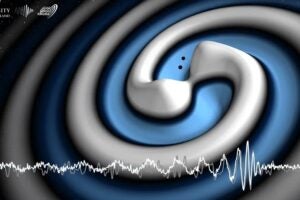AUSTIN, Texas—Grants totaling more than $1 million from the National Institutes of Health and the Lance Armstrong Foundation have been awarded to a University of Texas at Austin researcher who is working toward a testicular cancer treatment that will enable a patient to maintain fertility.
In the last 20 years, the drug cisplatin has been effective at killing testicular cancer cells, but there are detrimental side effects, according to Dr. John Richburg, assistant professor of pharmacology and toxicology in the College of Pharmacy. "Cisplatin is certainly a break-through drug," Richburg said. "But like many cancer drugs, it also kills normal cells — thus leading to infertility.
“Since testicular cancer is most common in young men from 15 to 30 years of age — infertility can be particularly devastating. We want to develop a treatment that will spare the normal germ cells while still eliminating the tumor cells.”
Richburg has received a five-year, $1 million grant from the National Institutes of Health and a $150,000 grant from the Lance Armstrong Foundation. He is presenting some of his preliminary findings at the annual meeting of the American Association for Cancer Research, which is being held April 6-9 in San Francisco.
Among other universities receiving funding from the Lance Armstrong Foundation are Columbia University, University of California at Los Angeles, the Dana Farber Cancer Institute, UT MD Anderson Cancer Center, Stanford University and Georgetown University.
The long-term goal of Richburg’s research is to provide key insights to explain the enhanced sensitivity to testicular germ cell tumors to cisplatin treatment. His lab at the university is internationally recognized for its work on revealing the molecular mechanisms that regulate cell death in the testis and the influence that environmental chemicals have on these processes.
"Our recent work is focused on understanding the mechanisms regulating cell death and applying that knowledge to address a human health/clinical problem — that of infertility after treatment with chemotherapeutic agents for testicular tumors," said Richburg, whose interest in the reproductive system came from his training experience as a postdoctoral fellow at Brown University. He and his toxicology students have been working with a receptor protein called Fas, which has been implicated in controlling the process of apoptosis or programmed cell death.
"Testicular germ cell tumors are extremely sensitive to elimination by chemotherapeutics," said Richburg, adding that this is reflected by the greater than 80 percent cure rate of these tumors. "However, the reason for their sensitivity to these agents is not well understood."
If successful, Richburg’s research project will give great insight into why germ cell cancer cells are able to be killed by cisplatin chemotherapy, said Douglas Ulman, director of survivorship at the Lance Armstrong Foundation. This could lead, said Ulman, to the development of other chemotherapy drugs based on this new mechanism of how cells undergo apoptotic cell death.
"These new drugs could add to the ability of germ cell cancers to be destroyed by chemotherapy. Additionally and perhaps more important, these new drugs could allow other cancers to be more effectively controlled leading to improved survival of patients," Ulman said.
Most important in any type of cancer research is trying to understand the cause and testicular cancer is no exception. "If we can understand the mechanisms of how the cancer arises, then we can develop more effective preventative strategies," Richburg said.
Editor’s Note: Dr. John Richburg will return to Austin Wednesday (April 10). He can be reached then at (512) 471-4736. Or, he can be reached while he is in San Francisco by email.



